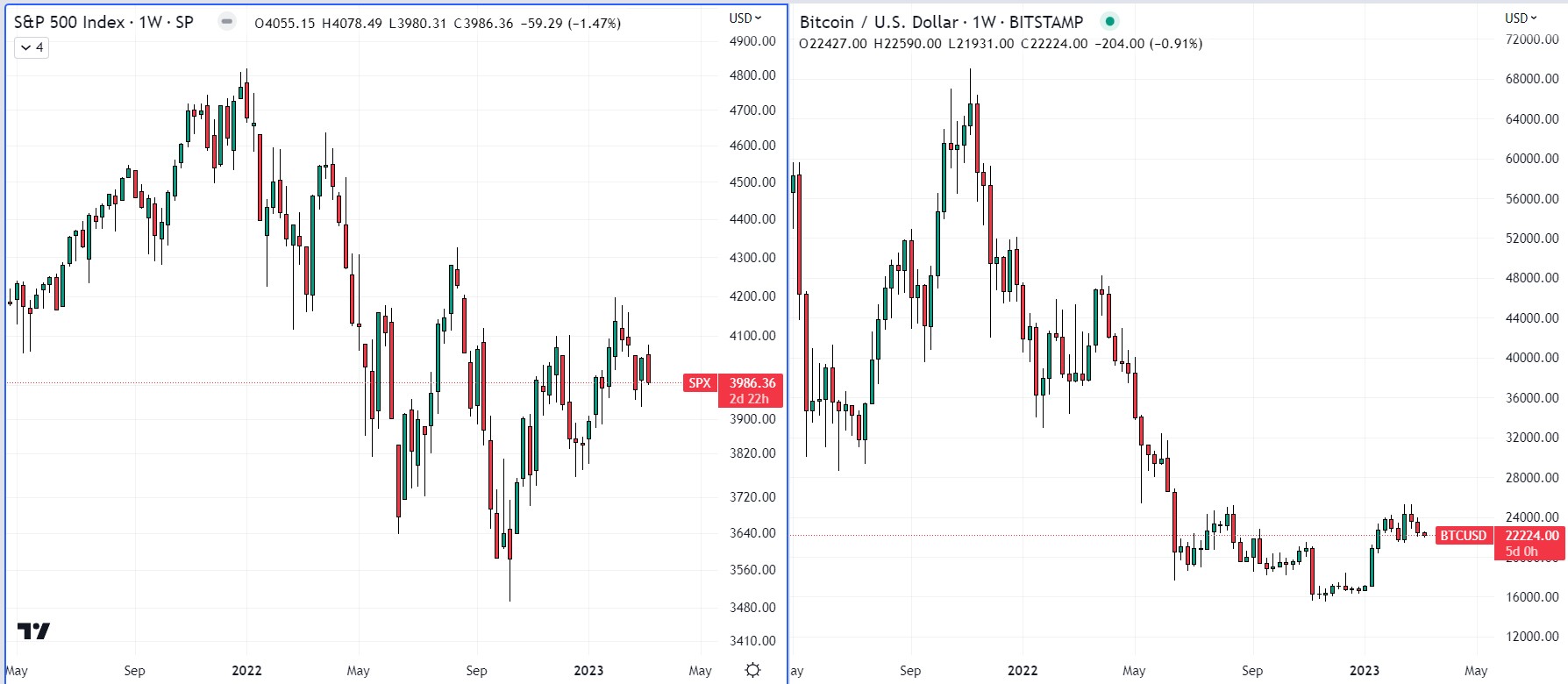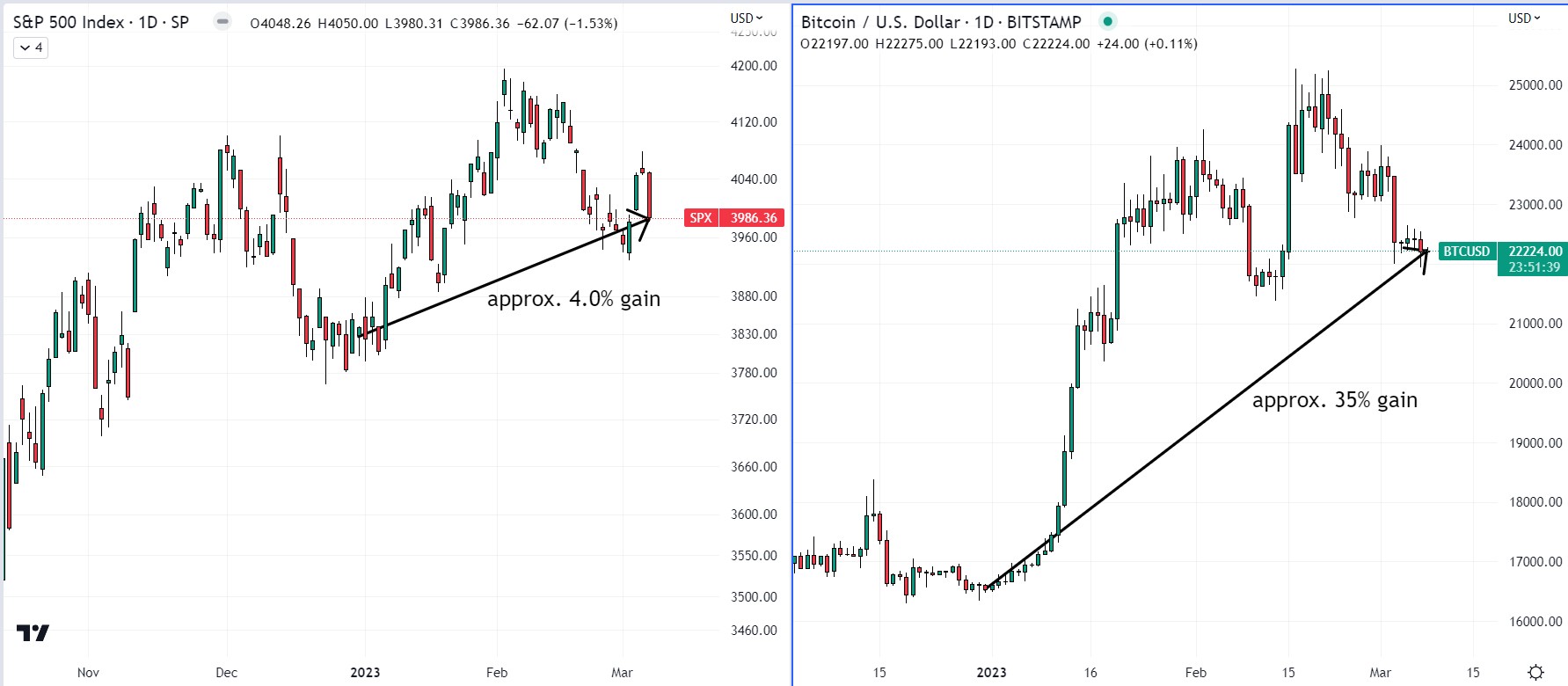Bitcoin’s Correlation to US Stocks is Fading – Why That Could Be a Good Thing for the BTC Price

The positive correlation between the Bitcoin price and US stock prices, which reached a record high in 2022, is fading. The Bitcoin bulls will be hoping that this decoupling bodes well for Bitcoin, given it might mean that the US stock market’s ongoing struggles might be becoming less of a headwind for the world’s largest cryptocurrency.
According to a chart presented by CoinMetrics, the 60-day Pearson correlation between the BTC price and the closing price of the S&P 500, the most widely followed US equity market benchmark, fell to its lowest level since April 2022 at 0.30 earlier this week.

The correlation had hit an all-time high of 0.667 in September 2022, after rising sharply earlier in the year as crypto and equity prices cratered in unison amid concerns about a stronger-than-expected pick up in US inflationary pressures and the resultant tightening response from the US Federal Reserve.

Bitcoin and the S&P 500 got smoked in unison in 2022. Source: Trading View
The fall in the correlation between the two asset classes comes in wake of crypto’s impressive rally since the start of the year. Bitcoin was last up around 35% on the year, while the S&P 500 is up a far more modest 4.0%.

Could a Lower Correlation to Stocks Mean the Bear Market is Over?
Bitcoin’s elevated correlation to US equity markets in the latter half of 2022 was a clear feature of the ongoing bear market that, by the lows in November, had seen BTC pull as much as 77% lower from its 2021 record highs at $69,000.
Prior to then, the 60-day Pearson correlation between Bitcoin and the S&P 500 had only ever been as high as 0.3 on a few occasions, and would frequently fall below zero. The few years leading up to 2022 when Bitcoin’s correlation to US stocks was much weaker were characterized by significant price gains.

Bitcoin gained over 2,000% from its 2018 lows just above $3,000 to its 2021 record highs. Bulls will be hoping that a lower correlation between Bitcoin and stocks, as was the case in the late-2018 to late-2021 period, ends up being a feature of an upcoming bull market.
Equity investors fear that the Fed’s aggressive efforts to stymie US inflation, which is currently remaining stickier than expected with the US economy outperforming expectations, will result in a deeper corporate earnings recession later in the year, dealing a further blow to stock valuations that have already taken a blow from the higher risk-free rate of interest (i.e. higher US government bond yields).
That’s why almost nobody is betting on a near-term surge in US stock prices back towards record highs. But a weaker correlation might allow Bitcoin to rally this year, despite ongoing pessimism about the outlook for US equities. However, the pullback in the BTC price from its recent above $25,000 highs has resulted in some on-chain indicators relating to Bitcoin market profitability sending a less bullish signal on the outlook for the world’s largest cryptocurrency by market cap. Some fear that Bitcoin could be headed back below $20,000 in the near future.






 Bitcoin
Bitcoin  Ethereum
Ethereum  Tether
Tether  USDC
USDC  TRON
TRON  Dogecoin
Dogecoin  Cardano
Cardano  Bitcoin Cash
Bitcoin Cash  Chainlink
Chainlink  LEO Token
LEO Token  Stellar
Stellar  Zcash
Zcash  Monero
Monero  Litecoin
Litecoin  Hedera
Hedera  Dai
Dai  Cronos
Cronos  OKB
OKB  Tether Gold
Tether Gold  Ethereum Classic
Ethereum Classic  KuCoin
KuCoin  Gate
Gate  Algorand
Algorand  Cosmos Hub
Cosmos Hub  VeChain
VeChain  Dash
Dash  Stacks
Stacks  Tezos
Tezos  TrueUSD
TrueUSD  IOTA
IOTA  Basic Attention
Basic Attention  Decred
Decred  Theta Network
Theta Network  NEO
NEO  Synthetix
Synthetix  Qtum
Qtum  Ravencoin
Ravencoin  0x Protocol
0x Protocol  DigiByte
DigiByte  Zilliqa
Zilliqa  Nano
Nano  Siacoin
Siacoin  Numeraire
Numeraire  Waves
Waves  Enjin Coin
Enjin Coin  Ontology
Ontology  Status
Status  Pax Dollar
Pax Dollar  BUSD
BUSD  Hive
Hive  Lisk
Lisk  Steem
Steem  Huobi
Huobi  NEM
NEM  OMG Network
OMG Network  Augur
Augur  Bitcoin Gold
Bitcoin Gold  Ren
Ren